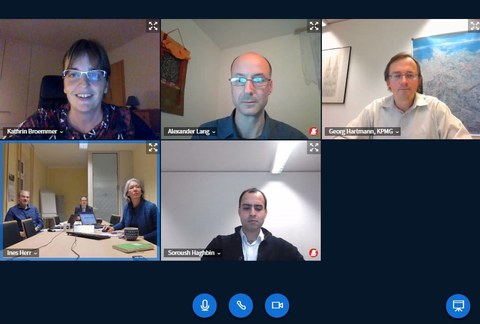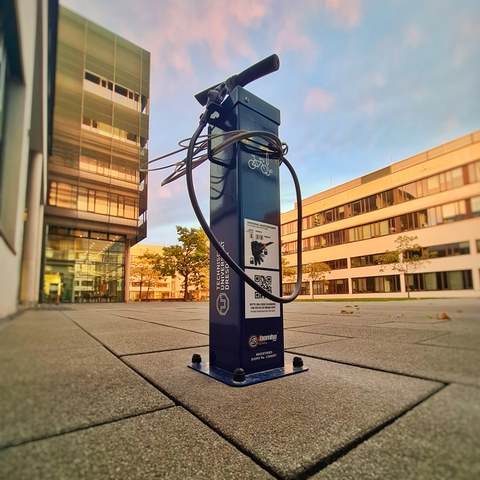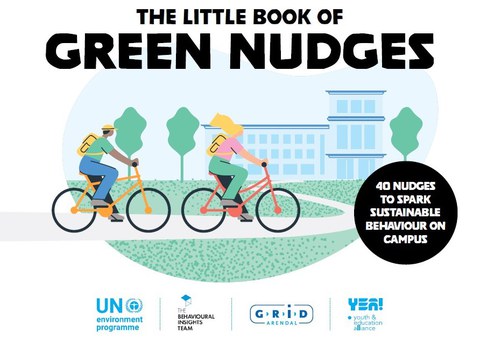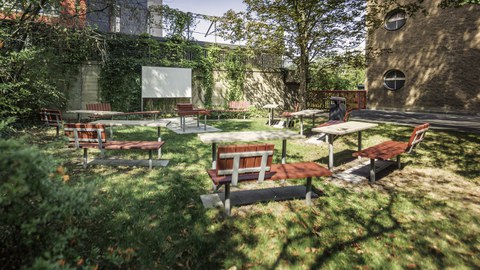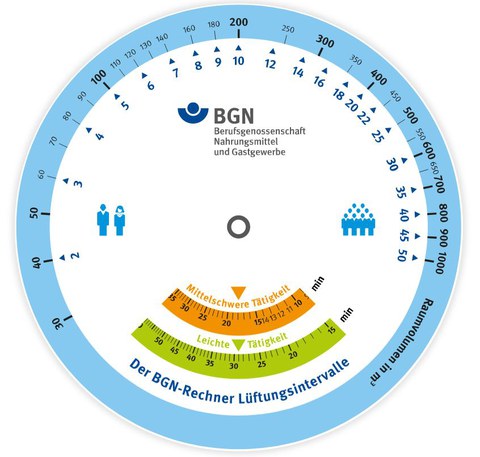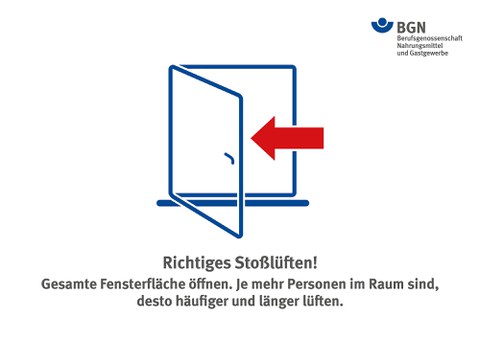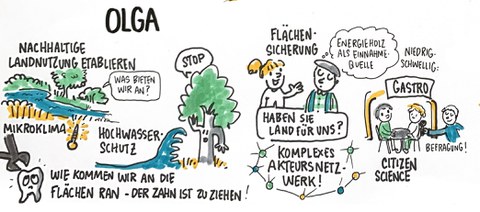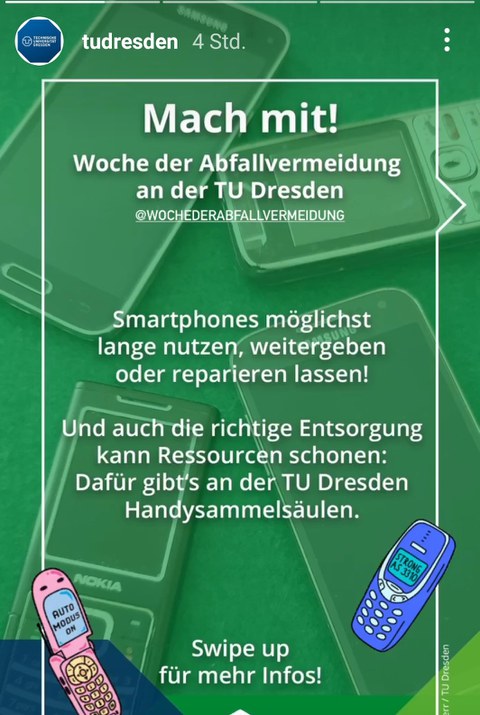Newsletter Occupational Safety, Environmental and Health Protection 02/2020
Contents
Student Projects, Initiatives and Events
Research for Environment and Sustainability
Environmental Management
Audit of the environmental management system of TU Dresden successful
On 30.11. and 01.12.2020, the TU Dresden successfully completed the audit of the environmental management system according to EMAS. Due to the special situation the audit was held as a video conference. All appointments, e.g. with the persons responsible for the environmental management system in Directorate 4, the Vice Rector for University Culture, the student environmental Initiative tuuwi or the management of the Botanical Garden, took place virtually. The reviewers appreciated the activities for the continuous improvement of the environmental performance and could not detect any deviations according to EMAS so far. A number of recommendations have been identified, which will be reviewed and implemented if necessary. However, the audit has not yet been completed. The prescribed on-site visits are expected to be carried out in March 2021. After that, the validity declaration will be issued by the auditors.
The preliminary environmental report for this year with the current key figures, but still without the validation statement of the auditors, is published on the Environmental Reporting website (in German).
Environmental management supports employee initiative
At the Center for Regenerative Therapies TU Dresden (CRTD), a group of employees has founded an initiative with the aim of more strongly incorporating aspects of sustainability into research, teaching and operations at the CRTD. At a kick-off event in autumn 2019, CRTD employees were informed about the sustainability initiative. The initiators collected first ideas, such as installing raised beds in the inner courtyard, building an insect hotel or putting up stickers to save water and energy. In order to uncover potential for reducing energy consumption, the energy measurement set was borrowed as part of the CamperMove project and the measurement portal was further developed during its use. Moreover, a bicycle repair station could be set up in the inner courtyard of the CRTD in October 2020.
TU Dresden participates in UNEP initiative "Little Book of Green Nudges"
In September 2020, the United Nations Environment Programme (UNEP) published the "Little Book of Green Nudges". The Little Book of Green Nudges is a quick guide to reducing environmental impacts on campus and includes behavior change actions for university staff, especially students, that can be easily implemented and also evaluated. The idea behind it comes from evidence-based behavioral research, which is about encouraging university staff to act sustainably via so-called "nudges" - little nudges - to "push without being pushy." Guidance has been developed in case studies at universities around the world and has been compiled in the "Little Book of Green Nudges." Topics include waste and recycling, mobility, the sharing economy, and sustainable food in the context of universities. With the publication, UNEP called upon universities to participate in a pilot project for the application of the LBGN. TU Dresden answered the call and is now one of over 200 universities worldwide that will apply "Green Nudges" on their campuses. The project will officially begin in January 2021. Then, participating universities will be asked to select their "Nudges" to implement on their campus. The project will be supported by UNEP with best-practice webinars.
TUD Climate Change Network - Webseite online
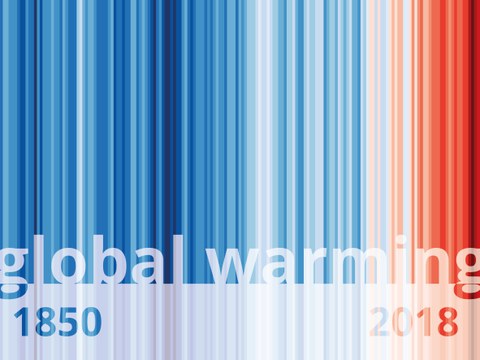
Warming Stripes – Darstellung der Durchschnittstemperaturen von 1850 - 2018
The rectorate of TU Dresden would like to strengthen the university's commitment against climate change. In doing so, the previous efforts and successes of all central and decentralized actors are to be linked even more strongly and backed up with a joint action plan. Therefore, the TU Dresden has started an open discussion process about content-related focal points, organizational structures, resources and processes, in which every member of the university can participate. Information about the Climate Change Initiative can be found on the website: https://tu-dresden.de/tu-dresden/umwelt-und-klima/climate-change, which is also referred to by a banner at the Hörsaalzentrum (HSZ) on Bergstraße.
Sustainable Campus
Symposium Butterfly Meadows - Review
We bring our environment into a supposed order with modern technology - lawn mowers, leaf blowers, power saws - and eliminate "wild growth" without being aware that we are destroying valuable habitat for butterflies, wild bees and other important pollinator insects. The Saxon State Foundation for Nature and the Environment, the Senckenberg Museum für Tierkunde Dresden, NABU, the Landesverband Sachsen e.V. and the Sächsische Landeskuratorium Ländlicher Raum e.V. therefore launched the project "Puppenstuben gesucht - Blühende Wiesen für Sachsens Schmetterlinge" six years ago.
Keynote from the Saxon State Minister for Energy, Climate Protection, Environment and Agriculture Wolfram Günther © TU Dresden
On 14.09.2020, in cooperation with the Saxon State Foundation for Nature and the Environment, the final conference under the title "Six years active for butterfly meadows in Saxony - results and perspectives" took place at the TU Dresden. There are now more than 600 butterfly meadows in Saxony, and the TU Dresden also manages its meadows in an insect-friendly way at 8 locations on campus. The Saxon Minister of State for Energy, Climate Protection, Environment and Agriculture Wolfram Günther emphasized in his speech the urgency of counteracting insect mortality with suitable measures. For the properties of the Free State of Saxony, appropriate action strategies will therefore be developed in the coming months on the basis of the project results. All presentations and discussion contributions are available on the YouTube page of the Saxon State Foundation.
Inventory of seminars and lectures regarding sustainability
In an initial inventory, courses with a thematic reference to ecological sustainability have been recorded since April 2020. Based on an overview of all courses offered, courses were considered whose focus can be assigned to the topics of ecology, nutrition, water, climate, waste, transport, resources, energy, agriculture and environment. These generalized terms initially served as a preselection. A research of the module descriptions followed. The resulting catalog represents a preliminary interim status, which must be further concretized and continuously updated. The catalog provides an initial overview of the large number of topics offered and can serve as a starting point for increasing the number of topics on ecological sustainability in individual courses of study. It is planned to make the recorded information also available to prospective students via the Central Student Advisory Service for their decision on the choice of study program.
Student Projects, Initiatives and Events
Poster seminar "Vision for a sustainable and digital TU Dresden in 2050"
At the Chair of Business Administration esp. Sustainability Management and Operational Environmental Economics of the Faculty of Business and Economics, a seminar on "Sustainable Business Management" was offered in the summer semester 2020, in which students created posters that were to deal specifically with sustainability at the TU Dresden. The topic for the poster work was "Vision for a sustainable and digital TU Dresden in 2050". The students developed scenarios (business as usual, worst case, best case) and derived corresponding goals for a vision for a sustainable digital TU Dresden. The posters and further information are available at: https://tu-dresden.de/tu-dresden/arbeitsschutz-umwelt/news/posterseminar-vision-for-a-sustainable-and-digital-tu-dresden-in-2050
Environmental Lectures of the TU Environmental Initiative (tuuwi) in the Winter Semester 2020/21
All students, employees and guests are invited to the Environmental Lectures series. Individual lectures of the series can also be attended. In the winter semester 2020/21, two lecture series are held exclusively as online events (in German):
Topics:
Strukturen der Macht – Gesellschaft in Zeiten der Klimakrise
“Grüner Hedonismus” – Ist eine lebenswerte Welt tanzbar?!
The lecture series have already started, but some of them can also be viewed later. Current information on the events can be found on the TU Environmental Initiative website.
Occupational safety
Ventilate - but how? Of course smart and correct!
The formula AHA (German for "keep distance, observe hygiene, wear a mask" was supplemented by the letter L in September 2020. L stands for ventilation (German: Lüftung) in all its forms - from room ventilation systems to free window ventilation. According to current knowledge, the coronavirus is transmitted primarily via droplets and aerosols (droplet nuclei < 5 µm), so room ventilation is of elementary importance in preventing infections.
With the arrival of autumn and winter and our more frequent stays in closed rooms, this topic is coming increasingly into focus, ranging from continuous ventilation to windows that are closed all day. But how is ventilation done correctly so that no one has to freeze or even catch a cold? Ventilation depends on the room volume, the number of people, the type of activities and the outside temperatures. The German Social Accident Insurance (DGUV) and the employers' liability insurance associations have provided a number of aids to help with this. For office rooms, the ventilation calculator of the Berufsgenossenschaft Nahrungsmittel und Gastgewerbe is particularly suitable. Here, room volume, number of people and activity severity can be set and then the ventilation interval calculated. The DGUV CO2 app also requires this information and determines when the value of 1000 ppm CO2 is exceeded and signals ventilation with an alarm.
Proper ventilation is achieved by push or cross ventilation. This involves opening either the entire window front or all windows and doors. In winter, a period of 3 minutes is sufficient. In spring and autumn 5 minutes and in summer 10 minutes are necessary. In addition to the important air exchange to prevent the transmission of the corona virus, all other viruses, bacteria, particles and the tiring CO2 that weakens concentration are removed and the room temperature is only lowered for a short time. The rule of thumb for seminar rooms and lecture halls, unless they are connected to a ventilation system, is three to five minutes of ventilation every 20 minutes. The aforementioned aids should be used for further concretization. Ventilate smart - stay healthy! And for the environment: please turn down the heating when ventilating, if possible!
Research for Environment and Sustainability
Project OLGA: Strengthening urban-rural partnerships for regional value creation in Dresden and surroundings
OLGA stands for the optimisation of sustainable land management along small watercourses and on agricultural land with the help of agrowood systems and the promotion of regional products in the Dresden Region. Five partners from science, practice and administration work together to strengthen regional cycles and cooperation in the field of energy wood use and nutrition.
The TU Dresden chairs of hydraulic engineering, forest botany and biodiversity and nature conservation analyse and evaluate agrowood plantations with regard to their watercourse and flood protection functions and provide recommendations for implementing those plantations and for using them as an energy resource. The realisation of an agrowood plantation is accompanied by the practical partner Biomasse Schraden e. V.
The Umweltzentrum Dresden analyses the supply of and demand for regional food in the Dresden Region. Together with farmers and gastronomers, possibilities for establishing urban-rural partnerships in food production, processing and marketing are being discussed. In cooperation with the Media Centre of the TU Dresden, Citizen Science activities are planned to draw the attention of citizens, gastronomers and traders to the potentials of using regional products and shortened production chains.
The overall coordination of the project lies with the City of Dresden. From April 2020 until March 2025 the Federal Ministry of Education and Research (BMBF) is funding the OLGA project as part of the "Stadt-Land-Plus" funding measure, which supplements the "Zukunftsstadt" flagship initiative with the perspective of urban-rural relations.
Further Information regarding the OLGA project (in German)
CAMPER-MOVE - On the way to an energy-efficient campus
The name of the project CAMPER-MOVE stands for CAMPusEnergy consumption Reduction - Measures for Energy Optimization for Resource-Saving Consumption Development at the TU Dresden. The project has been running since 2019 and is dedicated to the challenges that arise in connection with the required transformation processes for the TU Dresden campus and follows the predecessor project CAMPER. Practical implementation of measures of a structural-technical nature as well as for the support of economical user behavior will be evaluated and optimized through scientific monitoring. A 3-stage analysis system is currently being implemented for this purpose. Individual concrete measures were included in the environmental program of the TU Dresden for 2021, including the provision of an intracting concept for the TU, the further development of the energy measurement set as well as optimization recommendations for the meter infrastructure and the further development of the university´s energy management.
Further information about the CAMPER MOVE project (in German)
Article about the CAMPER MOVE project in the Uni-Journal of the TU Dresden (in German)
Hoch N: German Society for Sustainability at Universities founded
The joint project Sustainability at Universities: develop - network - report (HochN), which aimed to develop guidelines for the implementation of sustainability strategies in universities, has been in a transition phase since 01.11.2020. The nationwide funding by the BMBF is coming to an end. The initiators would like to continue the work of the network with the new foundation of the German Society for Sustainability at Universities (DG HochN). The DG HochN will initially focus on two main areas: Political lobbying as well as interactive events. At the same time, network contacts are to be maintained and HochN project results are also to be disseminated further. A wiki is currently being set up for this purpose. Starting in December 2020, so-called HochN Community Hubs (online) will take place approximately 1x per month. They are aimed at all interested parties from the HochN network. The events each consist of two connected meetings on both theoretical and practical topics. Further information on the network and the planned hubs can be found on the homepage of the umbrella organization at www.dg-hochn.de.
News in brief
European Week for Waste Reduction - TU Dresden participated with social media campaign
Every year, the European Week for Waste Reduction takes place throughout Europe. Thousands of public actions show alternatives to the throwaway society and waste of resources all over Europe. TU Dresden also participated in the campaign in 2020. Due to Covid-19 restrictions, a campaign was launched via Instagram and Facbook, where tips for everyday life at the university and at home on the topic of waste prevention were posted daily during the week of November 23-27. The five tips are now still available after the campaign week at: https://tu-dresden.de/tu-dresden/arbeitsschutz-umwelt/umwelt-und-nachhaltigkeit/ewav
Results City Cycling
In this year's city cycling event, the TU Dresden team, with 236 participants (previous year: 189), covered a total of 42,970 km (previous year: 30,780 km) and, as in the previous year, came in fourth out of 415 teams. Compared to the use of a car for the kilometers driven, a total of 6,317 kg of CO2 could be saved (previous year: 4,371 kg). Further information
Future Prize for Energy, Climate, Environment in Saxony - 961,000 euros in prize money paid out for 150 entries
In spring 2020, the State Ministry for Energy, Climate Protection, Environment and Agriculture launched the "eku Future Award for Energy, Climate, Environment in Saxony". Initiatives and projects could apply in two categories "eku idea" and "eku innovative". Local and regional commitment to the preservation of biodiversity in Saxony, to the support of the regional economy for the conservation of resources or to climate protection were to be honored. 240 entries were submitted, of which 150 received awards. The total prize money amounts to 961,000 euros. The detailed press release is available at: https://www.medienservice.sachsen.de/medien/news/243955
Tips for sustainable and regional consumption in Saxony
Even though shopping is not fully possible at the moment due to Covid-19 restrictions, here are two hints to useful websites:
Hin und Her, Kreuz und QUER - the interactive sustainability city map
For areas such as food, clothing, technology, furniture, gardens, recycling and many others, there is now the interactive city map, where you can find out where to buy sustainable products in your region. The goal of the project is to work towards more responsible consumer behavior in Dresden. Dresden already offers many opportunities in this regard. Click here for the sustainability city map: https://quergedacht-dresden.de/gd-home
Do you have your region on your radar? New web app from the Free State of Saxony
Locally produced food stands for freshness, short transport routes and jobs in the region. But who produces it? And how? Here's a new website with information about regional food and a self-test. In a four-part YouTube series, presenter Norman is on the road in the Free State, meeting farmers and food producers. For those who want to discover their region, here is the link to the new web app: https://www.regionales.sachsen.de/.
Desk calendar 2021
A desk calendar for 2021 has been published by the Saxon State Ministry for Energy, Climate Protection, Environment and Agriculture (SMEKUL). The desk calendar contains valuable tips for your own garden, how and where you can buy local quality products and which actions and events are planned in 2021. More information can be found here: https://publikationen.sachsen.de/bdb/artikel/36631
You are welcome to order the calendar from SMEKUL via the Environmental Protection Group. If you are interested, please contact

